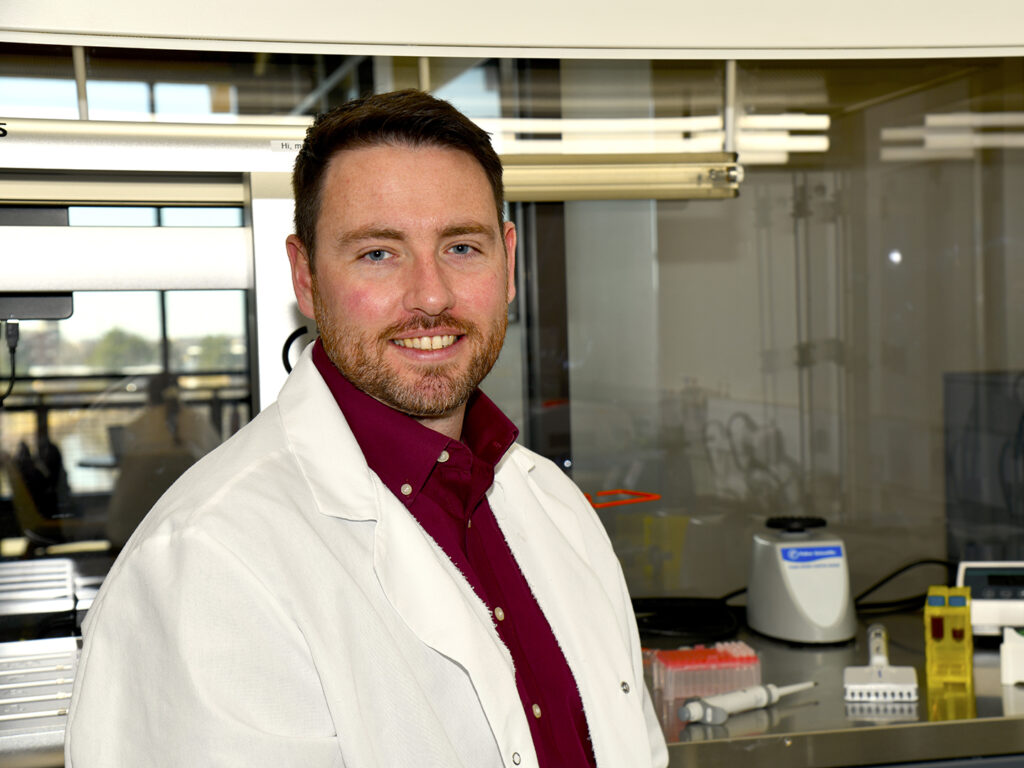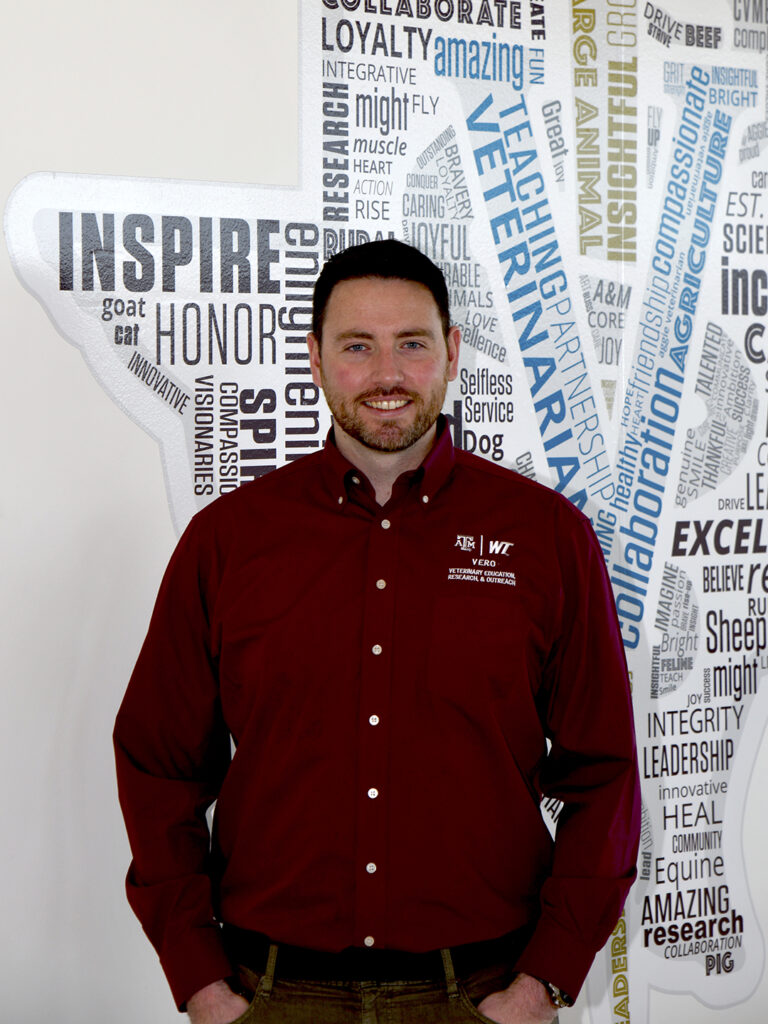Newest VERO Faculty Member Brings Environmental Microbiology To Texas Panhandle
Story by Megan Myers, VMBS Communications

Dr. Lee Pinnell is one of the few faculty members in Texas A&M’s Veterinary Education, Research, & Outreach (VERO) program who did not grow up planning to work in veterinary medicine.
Rather than being a veterinarian like many of his VERO colleagues, Pinnell is an environmental microbiologist who has spent his education and career studying much smaller organisms — the microscopic bacteria and other living creatures that can be found everywhere from soil and ocean water to our own digestive tracts.
“What I like about the microbial ecology field is that you can take the tools, skills and concepts and really apply them to anything,” Pinnell said. “It’s all the same kind of stuff; it’s just wrapped in a different context. I’ve jumped all over the place as far as environments and hosts go.”
Now, as a research assistant professor at the Texas A&M School of Veterinary Medicine & Biomedical Sciences (VMBS), he’s using his diverse skills and experiences to help tackle some of the most important issues in the cattle production industry.
From The Ground Up
Pinnell grew up in a small town in central Ontario, Canada, before moving south to study at the University of Waterloo.
He had his first experience with research while completing a bachelor’s degree in biology — working with aquatic ecologists to study zooplankton and invasive zebra mussels in Ontario.
Then, during a field course in the Bahamas between his third and fourth year, Pinnell stumbled into the field of microbial ecology.
“One of the faculty members on the trip, Josh Neufeld, did microbial ecology work and asked a buddy and me if we wanted to work with him as master’s students,” he recalled. “My master’s work was looking at microbial communities in tundra permafrost as part of a larger project that was biofuel-focused.”
After completing his master’s degree in 2011, Pinnell decided to take a break from academia and began working as a laboratory technician at The Hospital for Sick Children (SickKids) in Toronto.
“The best thing about VERO is the team. It has a very family-style feeling.”
Dr. Lee Pinnell
While studying Inflammatory Bowel Disease (IBD) and Crohn’s disease in one of the hospital’s gastrointestinal labs, Pinnell had his first experience investigating the gut microbiome, the community of microorganisms inside the digestive tract that convert food to energy and play a big role in the body’s overall physical and mental health.
After a couple years in the lab, Pinnell began to miss the opportunities for creativity that academia provides and started searching for a Ph.D. program in which he could expand his knowledge in computational biology and marine microbial ecology.
That search led him to Texas, where he began a doctorate in marine biology at Texas A&M University-Corpus Christi.
During Pinnell’s first visit to Corpus Christi, he was exposed to the pollution that plagues the Gulf Coast of Texas.
“It had rained really hard for a couple days, and in Corpus Christi, the water just flows down the streets and comes out of the storm drains into the bay,” he said. “Jeffrey Turner, my faculty supervisor, and I were driving along and saw that the shoreline and waters of Corpus Christi Bay were just littered with plastic. Jeff and I thought it’d be interesting to do a project on plastic pollution and how it’s impacting microbial communities in the area.”
In the Laguna Madre estuary, the body of water between Padre Island and the mainland where fresh and saltwater mix, the team exposed local microbial communities to plastic, biodegradable plastic and ceramic to study how the microbes colonized on and reacted to each material.
They found that the microbes in the biofilms on the biodegradable plastic tended to contain more sulfate reduction and antimicrobial-resistant genes than those on the typical plastic.
“So, while bioplastic is better from an environmental loading perspective because it’s being degraded when plastic is not, it’s still changing environmental processes,” Pinnell said. “It begs the questions whether bioplastic should also be considered a pollutant, since it’s changing baseline values in the environment.”
After spending about a year at the Shedd Aquarium in Chicago studying how probiotics impact beluga whales’ microbiomes, Pinnell found a postdoctoral research opportunity with Dr. Paul Morley, the director of food animal research at VERO.
Joining The VERO Family

Pinnell never expected to end up joining a program focused on production animal health.
“I didn’t even know animal science was a thing before 2021. We didn’t have those programs at the schools I went to,” he said. “I don’t think I’d ever been to a dairy, and I’d definitely never been to a feedlot.”
The team-oriented research environment that Morley cultivates is what initially attracted Pinnell to the VERO program, but it didn’t take long before he also started to enjoy working in a field that few other environmental microbiologists had explored.
“There weren’t as many people taking microbial ecology concepts and applying them to veterinary science,” he said. “It just felt like there was a window where we could do something unique, which was really cool to me.”
He also realized that what he thought was a disadvantage — having little background knowledge on cattle health and the production industry — turned out to be an advantage.
“Because I was a traditional environmental microbiologist, I had no preconceived notions of what’s supposed to be the cause of Bovine Respiratory Disease (BRD) or liver abscesses in cattle,” he said. “At VERO, everybody has slightly different perspectives, which is part of the reason we work very successfully — we don’t see things exactly the same way.”
His postdoctoral research focused largely on cattle liver abscesses, a common and serious issue in feedlots, and the role that the gut microbiome plays in abscess formation. Since then, he has expanded his research to include the microbial ecology of BRD and antimicrobial resistance.
When a faculty position became available in February 2023, Pinnell jumped at the chance to find a more permanent position at VERO.
“The best thing about VERO is the team. It has a very family-style feeling,” he said. “I’m always telling younger grad students that when they’re looking for labs, who you’re going to work with and those relationships are more important than the actual project.”
In Pinnell’s case, however, he happened to find a place that offers both a great team and a great research focus.
“The applicability of the research — how closely we work with the people who can actually implement the findings — is great,” he said. “That’s what’s really cool about Canyon, you can easily go and talk to someone who’s dealing with these problems every day.”
Looking Forward And Setting Goals
Two of Pinnell’s priorities for his work at VERO include continuing to grow his own knowledge and beginning to train and mentor graduate students and postdoctoral researchers.
“I’ve been so lucky throughout my career in that I’ve had amazing supervisors, so I really want to do a good job mentoring my students,” he said. “It’s important to me that they have a good experience, both with the research and just in general. Because if you don’t like something, you’re probably not going to continue to do it for a career.”
He also plans to continue conducting meaningful research and implementing the outcomes of that research however possible.
“VERO does a really good job of communicating with non-scientists, because there are a lot of ties between VERO researchers and Texas Panhandle producers,” Pinnell said. “I want to make sure that people are aware of what we’re doing and that they have access to the findings.”
###
For more information about the Texas A&M School of Veterinary Medicine & Biomedical Sciences, please visit our website at vetmed.tamu.edu or join us on Facebook, Instagram, and Twitter.
Contact Information: Jennifer Gauntt, Director of VMBS Communications, Texas A&M School of Veterinary Medicine & Biomedical Sciences, jgauntt@cvm.tamu.edu, 979-862-4216


